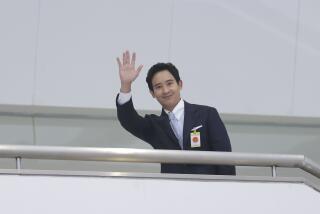Thai Premier Quits Over Economic Crisis
- Share via
BANGKOK, Thailand — The economic crisis that has brought turmoil to Southeast Asia for four months claimed its first political leader Thursday as Thailand’s Prime Minister Chavalit Yongchaiyudh resigned to make way for a new government that could restore international confidence.
Members of the opposition Democrat Party said they had cobbled together a coalition that will open the way for party leader Chuan Leekpai to take power. Chuan, 59, served as prime minister from 1992, when a coalition of civilian parties won power after nearly 16 years of military rule, until 1995.
The other leading candidate comes from the current coalition government. Chatichai Choonhavan, of the National Development Party, is also a former prime minister. His administration, which was known as very corrupt, was toppled in 1991 by a military coup.
Chavalit, who had headed a fractious, six-party coalition, lasted only 11 months as the leader of a country that since 1932 has had 22 prime ministers, experienced 17 coups and lived under 16 constitutions.
Chavalit’s government was widely criticized as corrupt and incompetent. In the 1996 election, for example, politicians spent an estimated $1 billion to buy votes. Vote buying is a common enough practice here, but the dollar amount was believed to have set a record.
Whether or not the Chavalit government was to blame for the recent free fall of the once highflying Thai economy, the general population and the media viewed him as the culprit.
“He made mistakes but in many ways he was the fall guy,” said Chaiwat Kamchoo, chairman of International Relations at Chulalongkorn University. “The people wanted someone to blame, and psychologically the country needed to feel it was getting a fresh start with new leadership.”
During the past two weeks, Chavalit maneuvered desperately to maintain power. He shuffled his Cabinet and blamed the media for exaggerating Thailand’s economic problems. His wife took to carrying a stuffed pink elephant wearing a diamond necklace for good luck.
But public discontent grew, as did the size of public protests. He did not, however, declare an emergency or ask the military to quiet the demonstrators. In May 1992, during a similar political crisis, the army opened fire on protesters, killing at least 50 people.
This time the army did not roll its tanks into the streets. Military leaders were instrumental in plans to form a new government but remained publicly silent--something that Western analysts interpreted as a sign of growing maturity in the democratization of Thailand.
“The very first priority of the new government has to be to regain the confidence of the international economic community,” said Abhisit Vejjajiva, a member of the National Assembly and spokesman for the Democrat Party.
“We cannot allow the currency to remain unstable,” Abhisit said. “We cannot allow capital to continue to flow out.”
Thailand’s seemingly robust economy has been in turmoil since its currency, the baht, was devalued in July. The baht has since lost about 40% of its value, and stock market prices have tumbled. Companies have closed, and it was revealed this week that Thai firms owe foreign creditors $90 billion.
With the crisis deepening, Thailand has accepted a $17.2-billion International Monetary Fund bailout offered in August in return for a reform package that includes reduced spending and reform of its freewheeling economic system.
More to Read
Sign up for Essential California
The most important California stories and recommendations in your inbox every morning.
You may occasionally receive promotional content from the Los Angeles Times.













